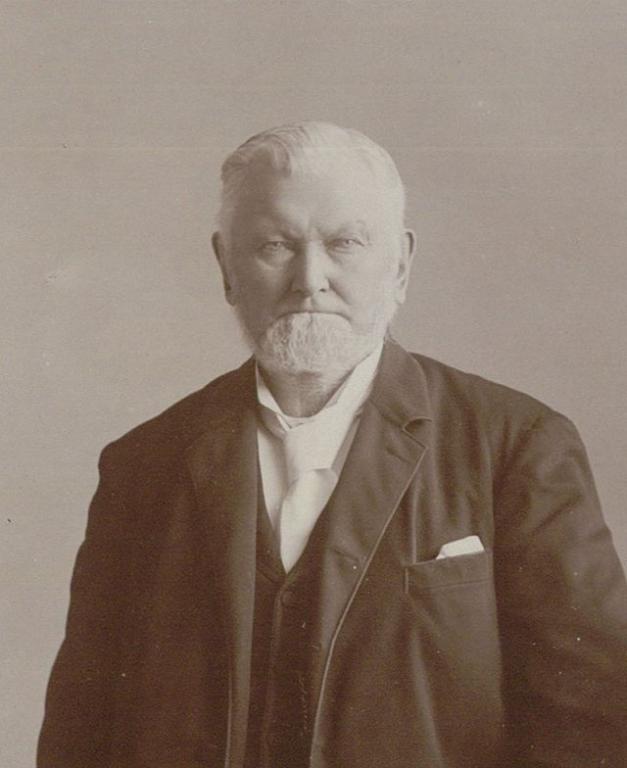
(Wikimedia Commons public domain)
I’m pleased to report that the audio version of Richard Gardner’s new article in Interpreter: A Journal of Mormon Scripture — “Consecration Brings Forth Zion, Not Just Disaster Relief: An Examination of Scholarly and Prophetic Statements on the Law of Consecration” — is now up. You can find a link to it (under the button labeled “MP3 Audio”) in the column to the right.
The audio of this article is four hours long. Many thanks to Richard Flygare for his service in reading the article.
This is a good opportunity to thank all of our readers. Often, articles are read by their authors. In many other cases, though, volunteer readers prepare our audio files. We’re deeply grateful to these volunteers. The Interpreter Foundation could not function without them and others like them.
***
I teach the Gospel Doctrine class in our ward. It’s my favorite Church calling. Today, we focused on Lesson 31.
I was happy to see the supplemental materials that were included for teachers:
“Our Hearts Rejoiced to Hear Him Speak”
“Plural Marriage in The Church of Jesus Christ of Latter-day Saints”
“Mercy Thompson and the Revelation on Marriage”
“The Messenger and the Manifesto”
I’ll share some passages that I particularly liked:
“Plural marriage did result in the birth of large numbers of children within faithful Latter-day Saint homes. It also shaped 19th-century Mormon society in many ways: marriage became available to virtually all who desired it; per-capita inequality of wealth was diminished as economically disadvantaged women married into more financially stable households; and ethnic intermarriages were increased, which helped to unite a diverse immigrant population. Plural marriage also helped create and strengthen a sense of cohesion and group identification among Latter-day Saints. Church members came to see themselves as a ‘peculiar people,’ covenant-bound to carry out the commands of God despite outside opposition.”
I actually found the article “The Messenger and the Manifesto” somewhat moving, perhaps because I spent a fair amount of time, many years ago, on a project centered (like the article) on George Q. Cannon. (It never really came to fruition.) Anyway, here are a couple of passages from it:
“George Q. Cannon was known during his lifetime for his powerful intellect. His fellow Apostles acknowledged him as a man without peer among the Church’s leadership. He was usually the Apostle who was asked to give the sensitive speech or write the delicate letter. The non-Mormon press called him ‘the Mormon Richelieu’ because he was thought to have been the genius behind all Mormon movements.
“But the reputation for genius also burdened George Q. Cannon. It bothered him to be credited as the source of ideas he did not invent and movements he did not initiate. He resisted being seen as the man behind the curtain. He well knew that his role was advisory. He was not the President of the Church, not the man who held the priesthood keys that led the Church. He humbly deferred to authority even if others could not see it.”
I second that verdict. I spent a lot of time reading his journals, and I was struck by his deference to, and deep affection and respect for, the men to whom he served as a counselor in the First Presidency. He did not see himself as the real brains of the outfit, but was totally devoted to the prophets. It’s a very noticeable trait of his private journal entries.
Here’s a passage describing his remarks at October conference in 1890, where he spoke about the Manifesto, issued by President Wilford Woodruff, that began the end of Mormon plural marriage:
“He told his audience that he had observed two reactions to the Manifesto among the Latter-day Saints. One reaction came from those who ‘feel to sorrow to the bottom of their hearts because of the necessity of this action that we have now taken.’ The other reaction was one of smug self-congratulation: ‘Did I not tell you so? Did I not tell you it would come to this?’ This latter group reprimanded Church leaders for taking so long to come around. Had the leaders acted more expeditiously, they argued, Church members could have been saved from years of suffering and heartache.
“Cannon said his own view differed from this second group. ‘I believe that it was necessary that we should witness unto God, the Eternal Father, unto the heavens and unto the earth, that this was really a principle dear to us—dearer, it might be said, in some respects, than life itself. We could not have done this had we submitted at the time that those of whom I speak suggested submission.’ No one could question the Saints’ willingness to espouse the principles they held dear. The ‘unmentionable’ sufferings of men, women, and children was credited to them in the heavens.”











